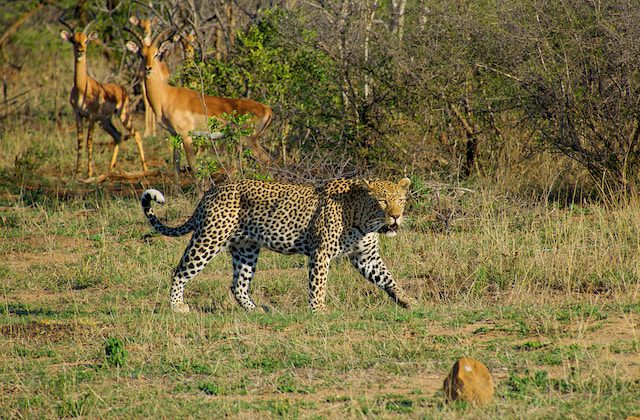Are you looking for the Kruger National Park entrance fee? From the enigmatic whispers of the savannah grasses to the echoing roars of the iconic African lion, Kruger offers an authentic and unparalleled safari experience.
Table of Contents
ToggleKruger National Park prices 2023
The Kruger National Park entrance fee for South African Citizens and Residents (with ID) is R115 per adult and R57 per child per day.
The Kruger National Park entrance fee for SADC Nationals (with passport) is R230 per adult and R115 per child per day.
How much does it cost to visit Kruger National Park for international visitors?
The Kruger National Park entrance fee for international visitors is R460 per adult, per day and R230 per child, per day.
Where is Kruger National Park located?
Situated in the northeastern part of South Africa, Kruger National Park spans across the provinces of Mpumalanga and Limpopo, right up to the borders with Zimbabwe to the north and Mozambique to the east.
How big is Kruger National Park?
Covering a vast area of approximately 19,485 square kilometers, Kruger National Park is one of the largest game reserves in Africa, providing a diverse habitat for its abundant wildlife.
What animals can you see in Kruger National Park?
The park is home to the famous ‘Big Five’ – lion, elephant, buffalo, leopard, and rhinoceros. In addition, visitors can spot cheetahs, hippos, crocodiles, giraffes, various antelope species, and over 500 bird species.
How much does it cost to visit Kruger National Park?
The entrance fee varies depending on the visitor’s nationality, with different rates for South African residents and international visitors. It’s recommended to check the park’s official website for the most current rates.
What is the best time to visit Kruger National Park?
The dry winter months (May to September) are ideal for wildlife viewing as animals congregate around waterholes. The wet summer months (October to April) bring lush landscapes and many bird species, but higher temperatures and a risk of malaria.
Are there malaria risks?
Yes, Kruger is situated in a malaria zone. Visitors should consult their doctors for appropriate prophylactics and always use mosquito repellents and nets when staying in the area.
What accommodation is available?
From luxurious private lodges to basic campsites, Kruger caters to all budgets. Many of the rest camps within the park offer accommodation, restaurants, and shops.
Also read: Kruger Camping Sites
Can I do a self-drive safari in Kruger National Park?
Absolutely! The park boasts a well-maintained network of roads suitable for standard vehicles. Just be sure to familiarize yourself with the park’s rules and regulations before setting out.
What are the park rules and regulations?
Some key rules include staying inside your vehicle (unless in designated areas), not feeding the wildlife, and adhering to speed limits. It’s important to respect these rules to ensure the safety of both visitors and animals.
How to get to Kruger National Park from Johannesburg?
The park is a 5-hour drive from Johannesburg. Alternatively, there are daily flights from Johannesburg to airports near Kruger, such as Kruger Mpumalanga International Airport.
Are there guided tours in Kruger National Park?
Yes, several guided game drives, bush walks, and wilderness trails are offered by the park, giving visitors insights into the ecology and wildlife of the area.
What’s the history of Kruger National Park?
Established in 1898 as the Sabie Game Reserve by President Paul Kruger, it became South Africa’s first national park in 1926. The park was developed to control hunting and protect the diminished number of animals.
Book a Kruger safari here
What safety precautions should I take in Kruger National Park?
Apart from malaria precautions, always follow park rules, stay on designated paths, and never approach or provoke wildlife. It’s also advisable to secure your belongings and accommodation.
Are there camping facilities in Kruger National Park?
Yes, many of the rest camps offer camping facilities with amenities like power points, barbecue facilities, and communal ablutions.
